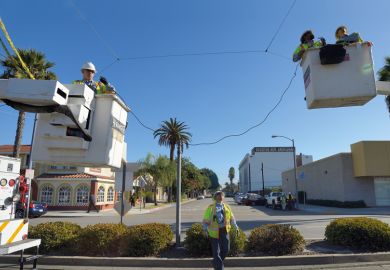Universities from across the G7 group of advanced economies are to come together to make “concrete commitments” on efforts to address climate change, inequality and the impact of technological change.
Thirty-six research-intensive institutions from Canada, France, Germany, Italy, Japan, the UK, and the US have formed the U7 Alliance, which will hold its first meeting in Paris on 9 and 10 July, ahead of the G7 summit in Biarritz on 11 and 12 July. They will be joined at Sciences Po by 10 invited universities from elsewhere in the world.
The U7 said that its summit – which will become an annual event – would end with the issuing of commitments focusing on “the inherent responsibility of being a world-class university today”. These would cover five key areas: “universities as key actors in a global world”; climate change and energy transition; inequality and polarised societies; technological transformation; and community engagement and impact.
These commitments will be presented to Emmanuel Macron, the French president, who will chair the G7 summit.
The U7 said that it wanted to see the G7 follow its long-standing support for primary education with increased efforts to widen access to higher education, and to address the challenges that global universities face around funding and technological change.
“In a changing geopolitical context, academic discussions and relations between universities are essential to leverage international dialogue. In this context, universities have gradually become diplomatic and political actors,” the group said.
Founding members of the U7 include 13 French universities, five each from the UK, Canada and Germany, four from Japan, three from Italy, and Columbia University in the US.
Michael Arthur, president of UCL – one of the founding members – said the U7 “brings together more than 30 leading universities, who all have a passion for sharing knowledge, finding solutions and making a positive difference to the world”.
“The global challenges we face are significant, from climate change, to disparities in global health, the increased polarisation of societies and widening inequalities. We also need to better utilise our transformative technologies, to bring about wider innovation that benefits more of society,” Professor Arthur said.
“Universities are uniquely placed to bring together research, expertise and best practices, which can positively affect our local, national and international communities.”
Professor Arthur added: “The U7 Alliance will stimulate discussion and ideas, with a view to making long-lasting commitments and taking concrete action and, in doing so, we can further demonstrate the public good of universities.”
nick.mayo@timeshighereducation.com
Founding U7 members
France
- Aix-Marseille University
- University of Bordeaux
- University of Côte d’Azur
- École Polytechnique
- Grenoble Alpes University
- HEC Paris
- University of Lyon
- Paris Diderot University
- Université Paris Saclay
- Paris Sciences et Lettres – PSL Research University Paris
- Sciences Po
- Sorbonne University
- University of Strasbourg
Canada
- University of British Columbia
- McGill University
- University of Montreal
- University of Ottawa
- University of Toronto
Germany
- Free University of Berlin
- University of Heidelberg
- LMU Munich
- University of Mannheim
- Technical University of Munich
Italy
Japan
- Hitotsubashi University
- Keio University
- Osaka University
- University of Tokyo
UK
- University of Cambridge
- University of Edinburgh
- Imperial College London
- London School of Economics and Political Science
- UCL
US
Also attending the U7 Summit
- Ashesi University, Ghana
- Australian National University
- University of Cape Town, South Africa
- Cheikh Anta Diop University, Senegal
- University of Ibadan, Nigeria
Mohammed VI Polytechnic University, Morocco - National Autonomous University of Mexico
- National Polytechnic Institute Félix Houphouët-Boigny, Ivory Coast
- National University of Singapore
- Seoul National University, South Korea
Register to continue
Why register?
- Registration is free and only takes a moment
- Once registered, you can read 3 articles a month
- Sign up for our newsletter
Subscribe
Or subscribe for unlimited access to:
- Unlimited access to news, views, insights & reviews
- Digital editions
- Digital access to THE’s university and college rankings analysis
Already registered or a current subscriber?









